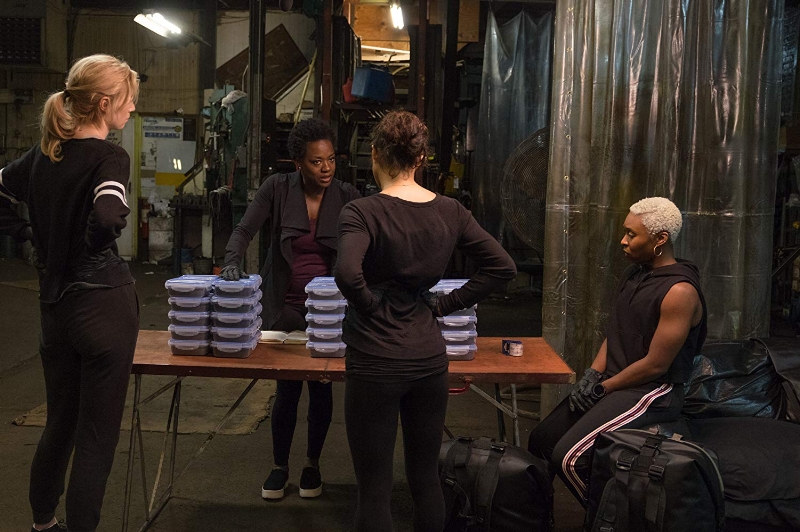WIDOWS
Directing: B+
Acting: B+
Writing: B+
Cinematography: B+
Editing: A-
It might be easy to write off Widows as just another serviceable heist flick, but there is power in the details. This isn’t only worth seeing because the heist in question is pulled off by four badass women — although, honestly, that was enough for me. But the more you think about this movie, the more of an impression it makes.
Consider the scene in which the camera is placed on the hood of a car, and most of the unbroken shot features the tinted windshield taking up most of the frame. But, a conversation happens between two characters, one of whom is Chicago city politician Jack Mulligan (Colin Farrell) and the other his assistant, as they ride between a campaign stop in an impoverished part of Chicago and Mulligan’s opulent home. You might wonder why the hell we just spent a few minutes looking at this windshield, and then the point comes home: these two neighborhoods, one very poor and one very rich, are not far from each other at all.
And there is much more going on in that shot, between the conversation itself (in which Jack asks his assistant if she’s ever slept with a black man) and the one character visible being his black driver.
Director Steve McQueen, returning now with his passion project five years after Twelve Years a Slave (2012), has a lot to say now about contemporary America in Widows, and it’s these many reflections that elevate this film from just another heist flick. I suppose you could consider this and Twelve Years a Slave companion pieces, that one having provided insight into where we once were and where we went from there; this one shows us where we are and brings to mind how we got here.
There was a somewhat curious clip of Viola Davis in recent weeks, which went semi-viral, of her discussion this film’s opening scene, depicting her and Liam Neeson as characters who are middle-aged, very much in love — and incidentally a mixed-race couple. I have to wonder now if that was part of guerilla marketing, because the clip suggests Davis and Neeson as a couple is incidental to the plot of Widows, and that is not the case as all. It’s not the driving force of the action or essential to the plot, but it’s still very much a part of both. The couple’s son and his race proves to be a key plot point.
That said, McQueen has plenty of tricks up his sleeve. Neeson is a pretty big star but barely gets supporting status here, existing almost entirely in flashbacks. And then a twist comes along that I did not see coming at all.
It’s certainly rare to get a movie like this, with such strength of storytelling, with women entirely at the center of the story, though — much less the primary character being a middle-aged black woman (Viola Davis). The basics of the plot are that all these women’s husbands perished in a job gone bad, and with an outstanding debt, they get together to pull the heist the men had planned. Indeed one of the best lines is when Davis’s Veronica says, “No one things we have the balls to pull this off,” and that’s what makes it exciting.
Viola Davis has long proven to be a stellar performer, and the other three women hold their own alongside her — although they are to varying degrees lesser known. They include Michelle Rodriguez of the Fast and Furious franchise as a woman facing the repossession of her clothing store she did not know her boyfriend used to repay his own debts; Elizabeth Debicki (The Man from U.N.C.L.E.) as a young woman intermittently battered boy her boyfriend and with a mother (Jacki Weaver) encouraging her to work as a call girl; and Cynthia Erivo was most recently seen as the best thing in Bad Times at the El Royale, stealing every scene she’s in with her stellar singing voice. She doesn’t sing here — that would be weird — but she does work as a fit babysitter struggling to make ends meet.
All of this is not even to mention Jack Mulligan’s complicated relationship with his own racist politician father (Robert Duvall), Mulligan’s crime boss opponent (Byran Tyree Henry) to whom the widows are indebted, or said crime boss’s ruthless henchman (Get Out’s Daniel Kaluuya). There’s a whole lot to weave together here in 129 minutes of running time, and McQueen does it well, to a degree that the editing in Widows might be its most impressive element.
When things predictably don’t go quite as planned during the heist itself — which takes quite a while to get to, as McQueen paces himself establishing characters, their motivations, and how they get together — what actually happens is not at all predictable. I hesitate to say the story empowers its female characters, given that they are all either criminals or complicit in plenty of crime, most of them evidently turning a blind eye to what their husbands did. They certainly all have autonomy though, and that’s really what makes all the difference.
Widows is cram packed with both story and characters, and that McQueen avoids reducing a single one of them to a stereotype is itself an impressive feat. This is entertainment, true — nothing that’s going to change the world — but Widows is complex ensemble storytelling at its best.
This is not your mother’s Tupperware party.
Overall: B+

